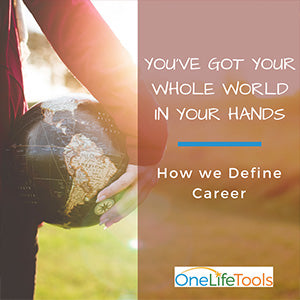Now that you have that song stuck in your head, let's begin!
At OneLifeTools we define career as:
"The full expression of who you are and how you want to be in the world, which keeps on expanding as it naturally goes through cycles of stability and change."
As we lead training, share in our Community of Practice calls and introduce new career professionals to our tribe, we start here.
I invite you to imagine that you're a client who has never thought about career development from this perspective. Do me a favour and re-read that definition one more time, with this new role you’re trying on. Now let's break it down together.
The full expression...
Think life, not job! 'Full expression' goes beyond work to also include volunteering, education and training, activities based on your interests, relationships, passions … it's all that you do.
 ...of who you are...
...of who you are...
This includes your desires, strengths, personal qualities, natural interests, bucket lists, education and credentials, additional skills, life roles, side hustles, past hurts and wins and the influence of other people. Don’t forget your own thoughts and feelings about who you are, and how you’re expressing yourself in the world.
...and how you want to be...
Most people know what they don't want, and they get stuck in the trap of only focusing on that. Negative experiences are valuable in helping you translate your "don't wants" into "wants." So, "I don't want to work alone as much as a freelancer" changes to "I want to work as part of a team".
Other people will say they are good with anything. This can be a trap too. It's tempting to take something "for now" that's decent enough. The trap here: if you don't know what you really want, you can get stuck in what you wanted to remain temporary.
What do you want? What's important to you? These are the questions that reveal your desires, and guide you as you navigate your life.
 ...it keeps on expanding...
...it keeps on expanding...
If you've ever thought your career is contracting, think again. There are no mistakes. Try thinking about it this way instead: negative experiences provide clarity about what you really want, because you get clear about what you don’t want.
...as it naturally goes through cycles...
It's perfectly natural that who you are changes. Think cycles, circles, and spirals, rather than a study-work-retire straight line.
...of stability...
We often think of career stability as a fleeting dream that no longer exists in today's economy. Whatever the duration of a job - 6 months, 6 years, 16 years - use that time to share your gifts. Rethink stability to mean that you're engaged with what you're doing. Stay rooted by that devotion even as both you and the world around you slowly shifts, building up towards what will eventually be the next big change on your horizon.
...and change.
It's a cliche, but the only constant is change in career development. One of the best things you can do is learn how to navigate through these changes and transitions beyond your first job, parental leave, lay offs and so on. Whether self-propelled or externally generated, many people reflect back on periods of change as both positive and challenging as they provide opportunity for career and life clarification.
This definition empowers clients by putting them at the centre of their own experiences, essentially, putting their whole world in their hands. What if you recast your approach to career using this definition? How could it change your sense of yourself as a practitioner? How could it change how you think about your own career? How could it change things for your clients? Let us know on Twitter @OneLifeTools!


 ...of who you are...
...of who you are... ...it keeps on expanding...
...it keeps on expanding...
1 comment
Apr 12, 2018 • Posted by Sally Gelardin
Right on Ali!
From my NCDA monograph, “Career & Caregiving: Empowering the Shadow Workforce of Family Caregivers.”
Career is both paid and unpaid work and life. Career is “the time extended working out of a purposeful life pattern through work undertaken by the person.” Work is an “activity that produces something of value for oneself or others,” including unpaid volunteer work, as well as paid employment (Reardon, Lenz, Sampson, & Peterson, 2009, p. 6). According to Sears (1982), career development is the "total constellation of economic, sociological, psychological, educational, physical, and chance factors that combine to shape one’s career (p. 139).
Career is also a course or passage through life. If we think of the role of [career practitioners and] caregivers as the designated driver on a life journey that can take one in many directions, rather than as one road, then the role of [career practitioners] and paid or family caregivers becomes richer, more variable, and open to exploration of alternative decision-making options.
Leave a comment: